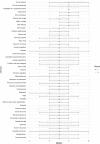Perinatal Resilience for the First 1,000 Days of Life. Concept Analysis and Delphi Survey
- PMID: 33224056
- PMCID: PMC7670043
- DOI: 10.3389/fpsyg.2020.563432
Perinatal Resilience for the First 1,000 Days of Life. Concept Analysis and Delphi Survey
Abstract
Background: The ability to cope with challenges and stress in life is generally understood as resilience. Pregnancy and parenthood are challenging times. The concept of resilience is receiving increasing interest from researchers, clinicians, and policy staff because of its potential impact on health, well-being, and quality of life. Nevertheless, the concept is less studied during the perinatal period.
Objectives: The aim of this study is to understand the concept of perinatal resilience, including the underlying processes and more specifically for the first 1,000 days of life.
Methods: A concept analysis according to the Walker and Avant (2011) framework was used, to investigate the basic elements of the concept. Concurrently, a two-round Delphi survey involving researchers, clinicians, epidemiologists, mothers, and fathers (N = 21), was conducted to prioritize the terms associated with perinatal resilience. Data collection took place between January and April 2019.
Results: Through concept analysis and Delphi survey, five defining attributes for perinatal resilience were identified: social support, self-efficacy, self-esteem, sense of mastery and personality. The additional terms, rated important by the Delphi survey, were linked to the consequences of being resilient during the perinatal period for the individual and his/her family. Specifically, highlighted were the experiences of families in personal growth and achieving family balance, adaptation, or acceptance.
Conclusion: Based on the results of the concept analysis and Delphi survey, we describe perinatal resilience for the first 1,000 days as a circular process towards a greater well-being in the form of personal growth, family balance, adaptation or acceptance, when faced with stressors, challenges or adversity during the perinatal period. The presence of resiliency attributes such as social support, sense of mastery, self-efficacy, and self-esteem enhance the capacity to be resilient and probably prevent mental health problems.
Keywords: childbirth; parenthood; perinatal care; perinatal mental health; resilience (psychological).
Copyright © 2020 Van Haeken, Braeken, Nuyts, Franck, Timmermans and Bogaerts.
Figures




Similar articles
-
A Concept Analysis of Maternal Resilience against Pregnancy-Related Mental Health Challenges in Low- and Middle-Income Countries.Healthcare (Basel). 2024 Aug 6;12(16):1555. doi: 10.3390/healthcare12161555. Healthcare (Basel). 2024. PMID: 39201115 Free PMC article. Review.
-
Mental health promotion through resilience and resiliency education.Int J Emerg Ment Health. 2002 Winter;4(1):65-75. Int J Emerg Ment Health. 2002. PMID: 12014295
-
[Elder resilience: a concept analysis].Hu Li Za Zhi. 2012 Apr;59(2):88-92. Hu Li Za Zhi. 2012. PMID: 22469896 Chinese.
-
Impact of protective factors on resilience of grandparent carers fostering orphans and non-orphans in Zimbabwe.J Aging Health. 2015 Apr;27(3):454-79. doi: 10.1177/0898264314551333. Epub 2014 Sep 25. J Aging Health. 2015. PMID: 25260649
-
The three-hit concept of vulnerability and resilience: toward understanding adaptation to early-life adversity outcome.Psychoneuroendocrinology. 2013 Sep;38(9):1858-73. doi: 10.1016/j.psyneuen.2013.06.008. Epub 2013 Jul 7. Psychoneuroendocrinology. 2013. PMID: 23838101 Free PMC article. Review.
Cited by
-
Prenatal maternal mental health and resilience in the United Kingdom during the SARS-CoV-2 pandemic: a cross- national comparison.Front Psychiatry. 2024 Sep 26;15:1411761. doi: 10.3389/fpsyt.2024.1411761. eCollection 2024. Front Psychiatry. 2024. PMID: 39391080 Free PMC article.
-
Suicide resilience: A concept analysis.Front Psychiatry. 2022 Sep 26;13:984922. doi: 10.3389/fpsyt.2022.984922. eCollection 2022. Front Psychiatry. 2022. PMID: 36226112 Free PMC article. Review.
-
Epigenetic Alterations of Maternal Tobacco Smoking during Pregnancy: A Narrative Review.Int J Environ Res Public Health. 2021 May 11;18(10):5083. doi: 10.3390/ijerph18105083. Int J Environ Res Public Health. 2021. PMID: 34064931 Free PMC article. Review.
-
Early Association Factors for Depression Symptoms in Pregnancy: A Comparison between Spanish Women Spontaneously Gestation and with Assisted Reproduction Techniques.J Clin Med. 2021 Nov 30;10(23):5672. doi: 10.3390/jcm10235672. J Clin Med. 2021. PMID: 34884374 Free PMC article.
-
"Nobody Listened". Mothers' Experiences and Needs Regarding Professional Support Prior to Their Admission to an Infant Mental Health Day Clinic.Int J Environ Res Public Health. 2021 Oct 17;18(20):10917. doi: 10.3390/ijerph182010917. Int J Environ Res Public Health. 2021. PMID: 34682666 Free PMC article.
References
-
- Adger W. N. (2000). Social and ecological resilience: are they related? Prog. Hum. Geogr. 24 347–364. 10.1191/030913200701540465 - DOI
-
- Alderdice F., Ayers S., Darwin Z., Green J., Jomeen J., Kenyon S., et al. (2013). Measuring psychological health in the perinatal period: workshop consensus statement, 19 March 2013. J. Reprod. Infant Psychol. 31 431–438. 10.1080/02646838.2013.835039 - DOI
-
- Antonovsky A. (1996). The salutogenic model as a theory to guide health promotion. Health Promot. Int. 11 11–18. 10.1093/heapro/11.1.11 - DOI
-
- Bandura A. (1982). Self-efficacy mechanism in human agency. Am. Psychol. 37 122–147. 10.1037/0003-066X.37.2.122 - DOI
Publication types
LinkOut - more resources
Full Text Sources
Miscellaneous

